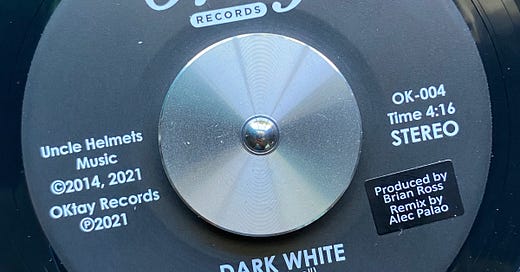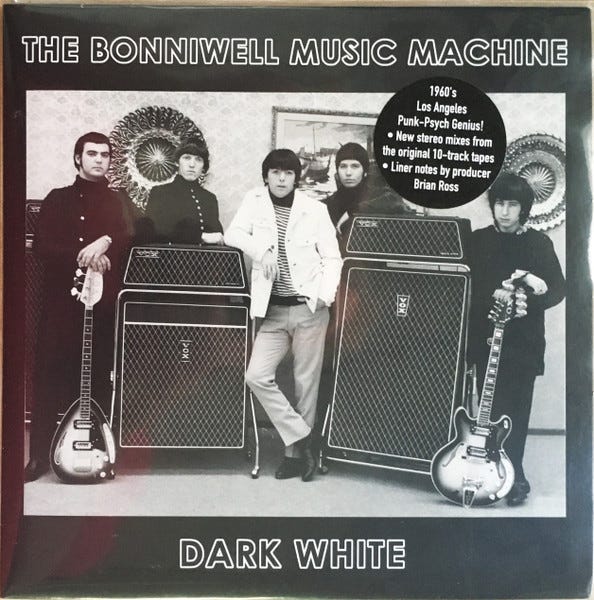My introduction to Sean Bonniwell and The Music Machine was pretty much everyone else’s: “Talk Talk,” the band’s searing hit single from 1966. Though I didn’t actually hear the song until 16 or 17 years after its original release — probably via Bob Stroud’s Sunday morning oldies show on WXRT — “Talk Talk” grabbed me from the moment I heard Bonniwell open his mouth, and doggedly refused to let go for the rest of its just-under-two minutes.
Not only did Bonniwell come across like someone almost delirious with anxiety and rage, but I had also never heard a voice like his on a rock record before. His singing was deep and resonant, and despite his apparent upset his diction was witheringly precise. As a similarly deep-voiced teen who took great pride in being well-spoken — and who was also often consumed by more than his own share of angst — I immediately identified with the performance, but it also made me kind of uncomfortable. My reaction was a simultaneous thrilling and repellent mixture of “Where has this song been all my life?” and “Dude, this is maybe a little too close to the bone.” I was so taken aback by how deeply I connected with “Talk Talk” that it would take a few more listens before I even noticed the song’s blistering fuzz guitars and funhouse start-stop rhythms.
Rhino Records’ 1984 compilation Best of The Music Machine featuring Sean Bonniwell provided further revelations. This was not a band whose one big hit was disappointingly dissimilar to the rest of their songs; if anything, Music Machine songs like “The People In Me,” “Double Yellow Line” and “The Eagle Never Hunts the Fly” were even harder, fuzzier and angrier cousins of “Talk Talk,” and all were filled with lyrical imagery that was incisively articulated yet obviously personal. It was clear that Sean Bonniwell had a vision that extended well beyond making his band dress in all-black ensembles that included a black glove on one hand (and one hand only); but what that vision actually was remained tantalizingly opaque.
Though I loved how brilliant Bonniwell and his band — which, at least for its first album and handful of singles, included future Millennium/Fleetwood Mac/Foreigner producer Keith Olsen on bass — were at serving up exquisitely efficient and explosive songs, the longest song on Best of The Music Machine never failed to catch my ear and ensnare me in its slow-building mystery. Clocking in at 4 minutes and 16 seconds, “Dark White” was over twice the length of “Talk Talk,” but I wouldn’t have minded if it had gone on even longer. With its eerie organ melody, shuddering strings and wordless “Ah-Uh-Aaah” chorus that conjured up images of reanimated corpses marching slowly in formation towards you, the moodily psychedelic cut could have fit right in on the soundtrack of an atmospheric late-60s horror film like The Oblong Box or Blood of Dracula’s Castle.
What was “Dark White” about? Was it a love song? A character study? A cry for help? Lyrics like “You’ve got to call/You’ve got to come/You’ve got to come get me/I know you know it’s over” dripped with despair, desperation and nameless horror, but ultimately revealed little. Bonniwell’s own liner notes on Best of The Music Machine were no real help either, describing the song as “deeply seductive, and suggests that there are mental virgins in the world.” Um, okay. But whatever it meant, I wanted to luxuriate endlessly in its alluring dread.
Like “Fire” by The Crazy World of Arthur Brown (another great song from 1968), “Dark White” was how I wished The Doors had actually sounded. I dug (and still dig) Jimbo & Co., but Morrison’s attempts to tap into mystic realms often sounded silly and unconvincing to me, less The Hero with a Thousand Faces than the hero sandwich with a six-pack. But listening to Bonniwell’s impassioned performance on “Dark White” made it clear that he didn’t have to conjure up the darkness — he was already deeply embedded in it.
Recorded at Hollywood’s Original Sound Studios on November 12, 1968 by the final Music Machine lineup, “Dark White” was shelved after “Advise & Consent” — a single recorded at the same session — sank like a stone upon release. Disillusioned with The Music Machine, Bonniwell split for a short-lived solo career, then left the music business entirely. “Dark White” didn’t see an official release until Rhino’s Best of The Music Machine, and has only made a few legitimate compilation appearances since then. But I’ve included it in countless mixes over the years, and have always secretly wished it had been released on a 45, my favorite music format.
Looks like the fine folks at OKtay Records heard my silent plea. Thanks to them, “Dark White” — in a stunning new stereo mix by Alec Palao — is now available on a limited edition 45 that also feature a previously unissued instrumental version on the flip. The latter is even more of a revelation than I was expecting, as it really lets you bask in the brilliance of Brian Ross’s production.
Ross, in his liner notes for this release, speaks extremely highly of Bonniwell — both as a songwriter and as an artist who could simultaneously grasp the minute details of a recording set-up while staying focused on his larger vision. “I had a big hand in ‘Dark White,’ Ross writes. “I brought the string players to give a little bit of mystery, but relative to any kind of arrangement that you hear, that song is from the heart and mind of Sean Bonniwell.”
Ross adds that if he were producing “Dark White” today, “I would have a 100-piece studio orchestra with a full SAG-AFTRA background choir behind Sean.” That would certainly be interesting to hear, though I doubt the song would be improved at all by such bombastic excess. What Ross and Bonniwell captured that day with just 10 tracks, a small recording budget and a handful of musicians remains fantastic enough.
If you want to own “Dark White” on 45, it’s probably best to act quickly — OKtay only pressed up 500 copies. Go get ‘em at the Ugly Things webstore while they last…







Excellent commentary on a truly underrated band/figure. I have the first Music Machine album, and I adore the original songs here. I'll seek and buy the 45 rpm single as well. Thank you.
Thanks for introducing these gems.